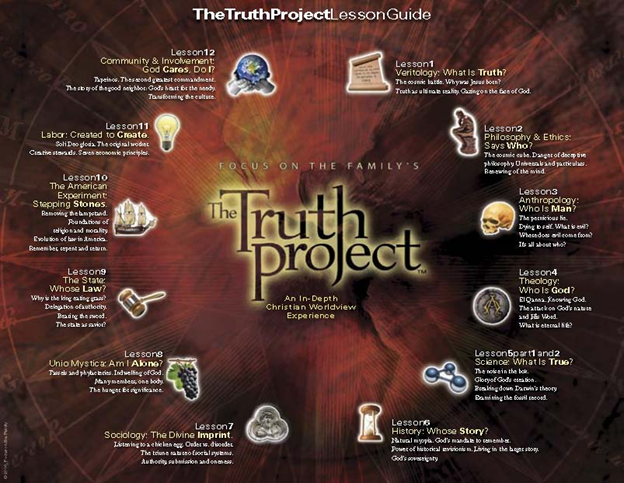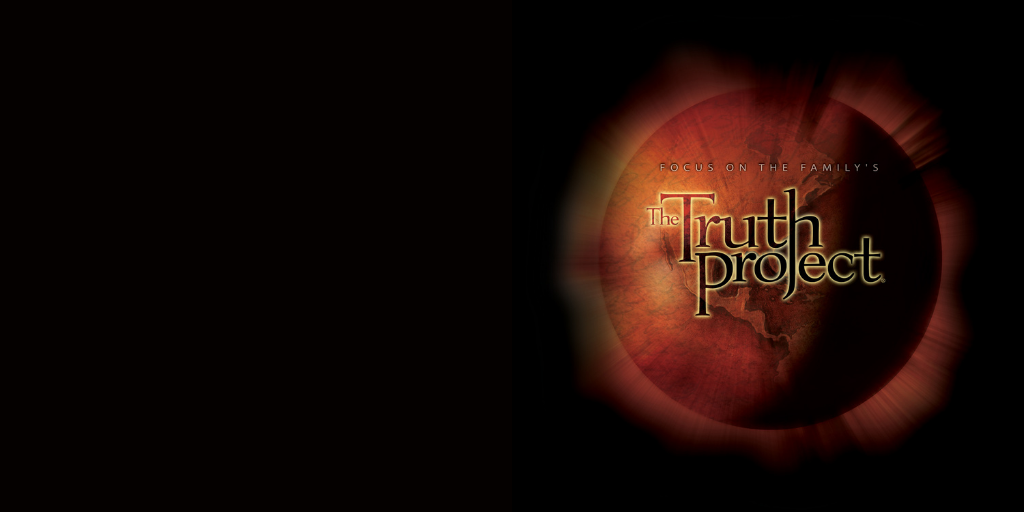This is an overview about The Truth Project*, an in-depth Christian Worldview experience led by Del Tackett and published by Focus on the Family.
Recently, I led a Sunday School class through The Truth Project. It was an excellent experience and gave the class a solid introduction to Christian worldview thinking. Because each lesson is an hour long in its original format and I still wanted to incorporate discussion, the class took around 6-months to complete. These are the overview posts for each of the Lessons.
Lesson 1 – Veritology: What is Truth?
In Lesson 1, Tackett asks his class with a vitally important question: Why did Jesus come into the world? In other words, why did the God of the universe come into a corrupt world to die for sins?
Lesson 2 – Philosophy & Ethics
Del Tackett opens up the second talk on philosophy and ethics with a reminder about the cosmic battle. As Christians, we can be taken captive by deceptive philosophies based on human traditions and basic spirits of the world – not according to Christ.
Lesson 3 – Anthropology: Who is Man?
Del Tackett introduces the nature of man in part 3 of The Truth Project with an interesting starting point: evil. By asking ‘what is evil’, he brings to the fore an integral theological insight about the nature of man and one of the core reasons why evil is integrated into our world. Tackett wants to stress the close connection between man and evil.
Lesson 4 – Theology: Who is God?
In this fourth part of The Truth Project, our “tour guide” Del Tackett tackles the important subject of theology. The aim of this segment was to begin to answer the question “who is God?”. In this lesson, we are aiming to study the existence, nature, and attributes of God, especially opposed to what the world will say about God.
Lesson 5 – Science: What is True?
Not everyone can see God’s handiwork in creation. Many people reject God’s witness in his created world through a sinful suppression of an obvious reality. The Apostle Paul makes it clear in Romans 1. “For what can be known about God is plain to them, because God has shown it to them.” (Romans 1:19). And why do these unbelievers not see God’s plain revelation in nature? Because they “suppress the truth” in unrighteous living (Romans 1:18).
Lesson 6 – History: His Story
Dr. Del Tackett opened up this lesson on history with a statement about the sovereignty of God. That is, God controls all things. Isaiah wrote about God controlling all things many centuries before Christ (Isaiah 46:8-11). By controlling all things, God ensures the outcomes he desires. God is in control of the future as well as the past. It is in this context that Tackett introduces the subject of history.
Lesson 7 – Sociology: The Divine Imprint
Tackett introduces his tour of sociology with a collection of verses that point to a divine order in creation. Psalm 19:1 reminds us, “The heavens declare the glory of God, and the sky above proclaims his handiwork.” We are reminded that God has revealed his glory within creation. And part of that glory relates to his order.
Lesson 8 – Unio Mystica: Am I Alone?
Dr. Tackett opens this tour in The Truth Project with an unusual statement related to Jesus and his people. Jesus, in prophesying about his death and resurrection, said in John 14:19-20, “Yet a little while and the world will see me no more, but you will see me. Because I live, you also will live. In that day you will know that I am in my Father, and you in me, and I in you.”
Lesson 9 – The State: Whose Law?
In this tour, Tackett takes on the sphere of the state. This sphere, Tackett warns, can grow to become the most menacing of the spheres because of its propensity to usurp the authority from other spheres – especially the authority of the family and church.
Lesson 10 – The American Experiment: Stepping Stones
In this tour, Dr. Del Tackett continues his discussion about the sphere of the state with an application in government in America. Tackett reminded the class that in the sphere of the state, there exists three entities: God, the King (short for civil magistrate), and citizens. However, when the king doesn’t consider God in the state, he soon thinks of himself as God. And Tackett quipped when the king thinks of himself as God, it’s not long before he becomes the devil.
Lesson 11 – Labor: Created to Create
In this tour, Tackett opens the Labor Tour of the The Truth Project with the 4th commandment (Exodus 20:8-11). Tackett takes the liberty to rephrase the ‘Sabbath Commandment’ to be the ‘Labor Commandment’ for this context. In this way, he reminds the students that most of the commandment relates to work, while only 1/7th of it relates to resting. Finally, he points out how the commandment pointed back to creation when God worked for 6 days and rested on the 7th day.
Lesson 12 – Community Involvement: God Cares, Do I?
Tackett aimed to tackle the second great commandment in the final tour of the study: “you shall love your neighbor as yourself.” In the parable of the Good Samaritan, we learn what a neighbor looked like. The Bible recounts the parable in Luke 10:25-37 where Jesus tells of a Samaritan who cared for a wounded and injured man at great expense while other religious leaders failed to render aid. In this way, the Samaritan fulfilled the second commandment.

* The copyright for The Truth Project is owned by Focus on the Family. I have shared this information in conjunction with fair use principles.



